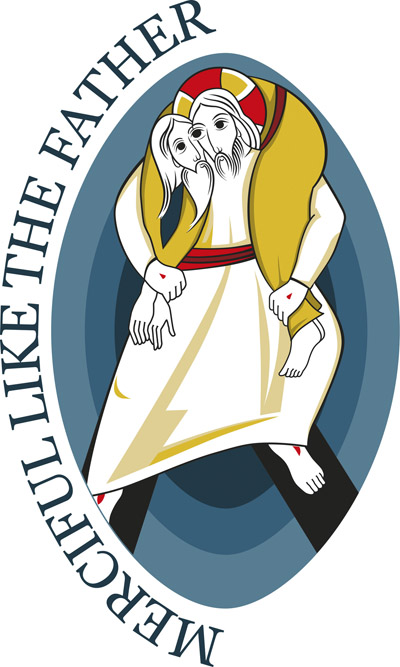
This is the logo for the Holy Year of Mercy, which opens Dec. 8 and runs until Nov. 20, 2016. (CNS/courtesy of Pontifical Council for Promoting New Evangelization)
Pope Francis came to America last month and virtually everyone loved him. How will future generations view him? When all is said and done, he many very well be known as the “the Pope of Mercy,” and nothing emphasizes this more than the Extraordinary Jubilee of Mercy he announced on March 13 of this year, and fleshed out through his “Bull of Indiction of the Extraordinary Jubilee of Mercy” issued on April 11.
“Mercy: the bridge that connects God and man, opening our hearts to be loved forever in spite of our sinfulness,” he wrote.
As directed by Pope Francis, the Jubilee Year will open Dec. 8, 2015, the Feast of the Immaculate Conception, and end Nov. 20, 2016, the solemnity of Christ the King. The date will also be the 50th anniversary of the closing of the Second Vatican Council, which was easily the most ground-breaking Catholic gathering of the 20th century.
[hotblock]
On Dec. 8, the Holy Door at St. Peter’s Basilica in Rome will be formally opened, with similar openings at the other major basilicas in Rome shortly after.
At the direction of Pope Francis in his Bull of Indiction all dioceses in the world are asked to designate a Holy Door, if practical at their cathedral and other major shrines.
In the words of Pope Francis, “Thus the jubilee will be celebrated both in Rome and in the particular churches as a visible sign of the Father’s love in the world.”
In Philadelphia the Jubilee of Mercy will open on Sunday, Dec. 13, through a 6:30 p.m. Opening of the Holy Door and Solemn Mass at the Cathedral Basilica of SS. Peter and Paul. This door will be closed at another Solemn Mass at 6:30 p.m. on Sunday, Nov. 13, 2016, the Sunday preceding the official closing of the Holy Year in Rome.
The Holy Door itself represents pilgrimage, the journey each of us makes in life.
“May pilgrimage be an impetus to conversion; by crossing the threshold of the Holy Door, we will find the strength to embrace God’s mercy and dedicate ourselves to be merciful with others as the Father has been with us,” Pope Francis wrote.
Visiting any of the pilgrimage churches satisfies one of the necessary acts to receive a plenary indulgence, which imparts full remission of any punishment due to sins that have been forgiven through confession, is granted by Pope Francis during the Jubilee of Mercy. Other conditions include reception of the Eucharist and prayer for the intentions of the pope.
In a Sept. 1 letter to Archbishop Rino Fisichella, president of the Pontifical Council for the Promotion of the New Evangelization, who oversees planning for the Extraordinary Jubilee of Mercy, Pope Francis went even further by granting the indulgence to shut-ins who perhaps may only be able to participate in Mass and the sacraments through electronic media. He similarly granted it to prisoners who may have access to the sacraments and may fulfill the other requirements to the best of their ability. The indulgence could also be assigned by the recipient to a deceased person.
In the Philadelphia Archdiocese much of the planning is being done by the Office for Divine Worship and the Office for the New Evangelization.
In addition to the cathedral and any other local churches or shrines that may be designated, Philadelphians may fulfill the requirements for the plenary indulgence through participating in the bi-annual pilgrimage to the Basilica of the National Shrine of the Immaculate Conception in Washington, D.C., scheduled for April 26, 2016.
[hotblock2]
There will be a series of 12 monthly Holy Hours of Mercy held at various parishes to be announced later. The April 3 holy hour will be at the Cathedral Basilica of SS. Peter and Paul.
A special observation will be 24 Hours for the Lord, which Pope Francis has asked all dioceses to initiate March 4-5, the Friday and Saturday preceding the Fourth Sunday of Lent. It was first established in Rome last year.
If it sounds like a miniature version of 40 Hours (which in its original format had churches open for 40 straight hours), it is not.
Like 40 Hours, 24 Hours for the Lord does include Eucharistic Adoration but at the heart of it is ample opportunity for confession, which really gets to the intention of Pope Francis through the Year of Mercy.
Additional initiatives by the archdiocese during the Year of Mercy include, among others:
• A calendar for special Masses during the year;
• Guidelines for communal penance services, formally called the Rite of Reconciliation for Several Penitents with Individual Confession and Absolution;
• Promotion of additional availability of the sacrament of penance and absolution during Wednesday evenings in Lent;
• Catechesis on the spiritual and corporal works of mercy;
• Catechesis on the rite of penance, the Catechism of the Catholic Church and the apostolic exhortation of Pope John Paul II, “Reconciliation and Penance;”
• Encouragement of the faithful to recite the Chaplet of Divine Mercy daily;
• Catechetical reflections in parish bulletins on 12 themes related to mercy.
To sum it up there are three aspects to what Pope Francis has asked of us, according to Meghan Cokeley, the director of the archdiocesan Office for the New Evangelization. They are “contemplation of the mercy of God, our response to that mercy (and) our call to show mercy to others,” she said.
***
For more information and further updates throughout the year visit the Year of Mercy website at www.archphila.org/mercy
PREVIOUS: Jenkintown parish marks 150 years with Mass, big block party
NEXT: Churches in Manayunk, Fallsington set to close


Share this story